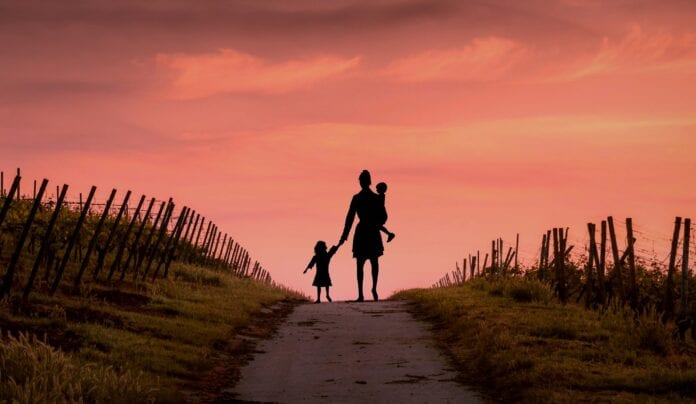Hundreds of thousands of people are already locked in poverty in Wales and more risk being pulled under as the economic fallout from Covid-19 grows, according to a new state of the nation report.
Before coronavirus hit, almost a quarter of people in Wales were living in poverty. After a decade of stalling progress, in which that proportion has barely changed, Wales now faces a rising tide of poverty as the Covid recession gathers pace.
In its latest state of the nation report, Poverty in Wales 2020, the Joseph Rowntree Foundation shows that a combination of low pay, unaffordable housing and a lack of childcare is trapping 700,000 people in poverty. That includes 180,000 children, of which 140,000 live in families already receiving income-related benefits – the social security system is failing to help many families keep their heads above water.
The pandemic has hit low-paid workers in Wales particularly hard: industries with a large proportion of low-paid jobs, such as the Accommodation, Food & Beverage sector, have seen 78% of jobs furloughed. Those same sectors are most likely to see widespread job losses, and in some areas of over 40% of jobs are in these high-risk, low-paid industries.
Many people have already lost their jobs and by August the number of Universal Credit claimants had almost doubled from the start of the year. Parts of the country with large numbers of at-risk jobs also have very high numbers of unemployed claimants per job vacancy, such as like Rhondda Cynon Taf (37 claimants per vacancy) and Merthyr Tydfil (35 claimants per vacancy). These areas were already struggling before the pandemic and without further support poverty levels are set to increase.
Peter Matejic, deputy director of evidence and impact at the Joseph Rowntree Foundation, said:
“Too many people in Wales entered this pandemic already locked in poverty. As job losses loom and the recession starts to bite, that number is set to rise.
“Families up and down the country are struggling to keep up with rent and put food on the table – this is not the kind of society we want to be. Governments in both Cardiff and Westminster must now take decisive action to support those in need through the pandemic and beyond.”
Dr Victoria Winckler, director of the Bevan Foundation, said:
“It’s not right that so many people are trapped in poverty in Wales today. Coronavirus has had a huge impact on all our lives but people on low incomes have been disproportionately affected.
“The pandemic has shown that the Welsh Government has the power to do things differently. It has already stepped in to provide Free School Meals in the holidays, increased emergency help to families in financial crisis and committed funding for long-term solutions to homelessness. But there is more it can do to support the people and places hit hardest.”
By June 2020 around 400,000 adults had fallen behind on bills, with 200,000 falling behind on rent or mortgage payments. This comes as no surprise: going into the pandemic Wales had the second-highest poverty rate for private renters in the UK, at 41%. The Welsh Government has also allowed rent increases in the social rented sector to outstrip inflation and recently permitted rents to increase above inflation for a further five years. The result has been rapidly increasing poverty amongst working social renters, a situation that will only worsen unless the Government changes tack.
The Welsh Government is also falling short on childcare. Parents of three to four-year olds are entitled to 30 free hours of childcare a week, but to qualify they must work an average of 16 hours a week at minimum wage. Many families in poverty who are working fewer than 16 hours are locked out of receiving free childcare, preventing them building up experience and skills to secure more work. For working families, access to childcare that matches working hours is critical for escaping in-work poverty. But 43% of local authorities report that there is insufficient childcare provision for parents who work atypical hours – who are much more likely to be on low pay.
Action from both UK and Welsh Governments is needed to turn the tide of rising poverty in Wales. The Welsh Government should:
- Develop a new childcare offer based on seamless provision for all children. This would include a core of free, part-time childcare and early years education for pre-school children and increased provision of affordable before- school, after-school and holiday childcare, modelled on proposals from the Bevan Foundation.
- Guarantee that social rents are affordable by ensuring that they do not outpace wages or benefits and build 20,000 homes available for social rent over the course of its five-year term.
- Focus its economic strategies on job creation and retention in the areas of Wales with the weakest local economies and those which are being hardest hit by the pandemic, including the south Wales valleys and rural Wales.
- Actively consider the merits of the Bevan Foundation’s proposals to improve and bring together the existing devolved grants and allowances into a coherent and effective ‘Welsh Benefits System’. This could mostly be established within the powers already devolved to the Welsh Parliament and would complement the UK social security system.
The UK Government should make the £20 uplift to Universal Credit and Working Tax Credits permanent and extend it to families on legacy benefits. Keeping this lifeline will help many families stay afloat through the economic uncertainty that lies ahead.
Help keep news FREE for our readers
Supporting your local community newspaper/online news outlet is crucial now more than ever. If you believe in independent journalism, then consider making a valuable contribution by making a one-time or monthly donation. We operate in rural areas where providing unbiased news can be challenging. Read More About Supporting The West Wales Chronicle


























